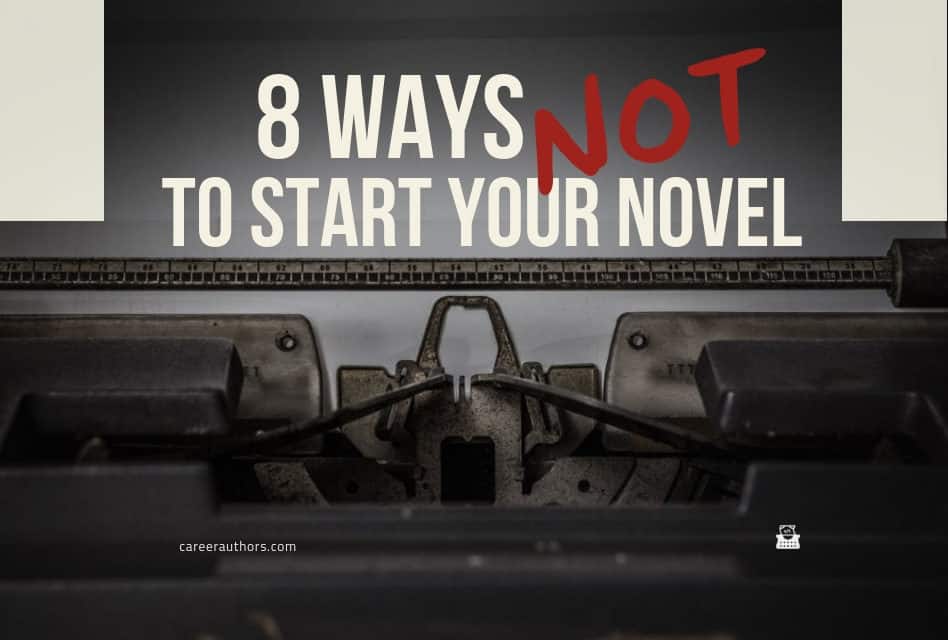We have talked before about the best ways to start your novel. Let’s consider the flip side of that and look at ways not to start your novel or story. [Important caveat: There exist great books that have opened with each of these no-nos, and I’m sure some future writers will use these techniques to interesting and page-turning effect. So consider these tips to be general guidelines, rather than hard and fast rules.]
1. Dialog
Although dialog seems like a good way to draw a reader in, when a reader doesn’t know where the scene takes place or who’s talking, opening with dialog can be too confusing. You might get away with a single line of dialog, followed immediately by identifying the speaker and location.
2. Weather
“It was a dark and stormy night.” We all know the classic example of a weather-related bad opening line. It’s ineffective because it doesn’t involve readers with a character or show how the weather affects the characters or plot. If you must start with weather, make sure it impacts a character. “The torrential downpour churned the ground to mud which dragged at Willy’s boots as he trudged through the woods, cradling the girl in his arms.”
3. The wake-up
Watching someone wake up and brush her teeth is boring. Unless a team of international assassins rappels through the roof in the second sentence, or a stranger steps out of the shower, starting with someone waking up means you’re not starting in the middle of the action (in medias res). Fast forward from the wake-up and start where the story really starts—with emotion, conflict, or action.
4. Getting from point A to point B
See 3, above. If the character is in a car or plane, or on a skateboard or train, musing about what’s in store for his day, or reflecting on what happened at his departure point, you’re not in the action.
5. A funeral
This can feel like a choice with built-in emotion and conflict, but is it really? If readers don’t know the character and aren’t privy to her relationship with the deceased, a funeral has little emotional impact. If you walked into a stranger’s funeral and didn’t know anyone in the room, would you be sad? No. Additionally, readers might not be immediately attracted to a soggy, Valium-deadened, bereaved protagonist.
6. Dreams
Starting with a dream can feel like a cheat or a trick. If you open with a dream laden with action or gore, mysterious figures, cryptic utterances, or something similar, and then your character opens his eyes, where are you? [Hint: see 3, above.] If it’s going to be a while before your story gets to strong action and emotion, it can be tempting to open with a dream to infuse those elements earlier. Don’t. Find a way to get into the heart of the story sooner.
7. Gazing into a mirror or other reflective surface
Newbie writers seem to think that readers want to know up front exactly what the protagonist looks like, down to the way his eyebrow arches or the size of her nostrils. Not so. Readers will construct an image of the characters based on the most meager of descriptions. Describing your protag in the first paragraph is almost always unnecessary and boring. [Other CA posts have talked about how to describe your narrator, but that description rarely has to happen on the first page.]
8. Exposition
Otherwise known as “backstory dump” or “the Star Wars scroll” technique, opening your novel like this presumes your reader needs to know everything about the world or the protagonist’s life to date before getting into the real story. Unlikely. A better technique is to weave exposition and backstory gradually into the book as it becomes pertinent.
Don’t start with “Bob knew the bio-weapon [insert technical jargon] was due to go off at the corner of Sixth and Main at noon. He and his team, Ringo the explosives expert, Dolly the computer whiz, and Junior, the dog handler were intent on finding it before it wiped humanity off the planet.”
Just show the team racing toward Sixth and Main. Readers are very, very smart. They will catch on soon enough. You don’t need to spoon feed them the deets on page one.
Do you have other openings that you would add to the “not generally a good way to start your novel” list? Tell us on Facebook.





